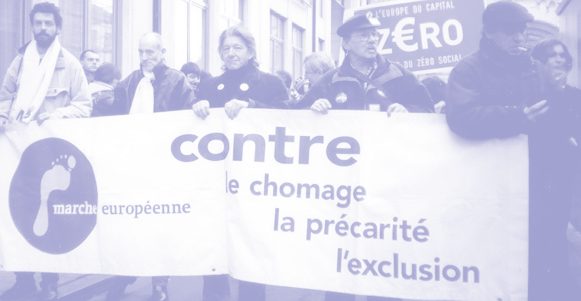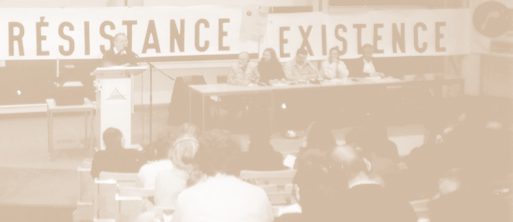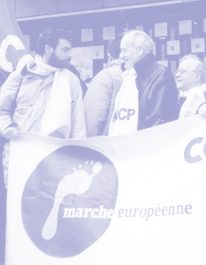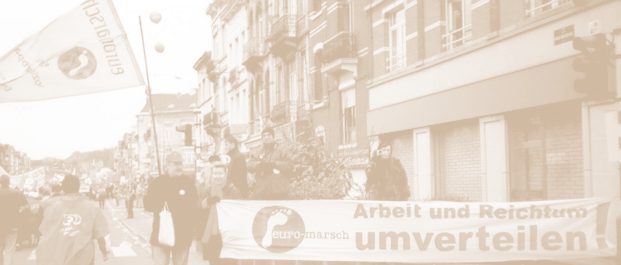

 |
 |
 |
 |
 | ||
European Marches
|
||||||||||||||
| ||||||||||||||
What in the future? |
||||||||||||||
LISBON AGENDA: More and Better Jobs?Eric Conroy (General Secretary of INOU, Ireland) 
The Lisbon Agenda social goal of the EU is « to become the most competitive and dynamic knowledge-based economy in the world capable of sustainable economic growth with more and better jobs and greater social cohesion ». The Lisbon strategy also aims to make « a decisive impact on the eradication of poverty » by 2010. The INOU welcomes the fact that the Taoiseach has named the Lisbon strategy as one of his priorities for the Presidency, and specifically that of more and better jobs. We are concerned that some Government statements and some media coverage describe the Lisbon strategy as being only about a particular narrow version of competitiveness. The Lisbon strategy agreed to a 10-year process (2000-2010) based on three pillars: Sustainable Economic Growth, More Employment & Quality Employment and Social Inclusion. The Lisbon Agenda is annually reviewed at the Spring summit of the EU. With Ireland’s presidency of the EU, Bertie Ahern will be chairing this year’s discussions at the next summit in March held in Brussels. Therefore, the Lisbon Agenda was the first item on the agenda of the plenary of Sustaining Progress in January 2004. General Secretary Eric Conroy spoke at the plenary on the above aspect in the following terms. In the debate on making Europe « the most competitive and dynamic knowledge-based economy in the world », the emphasis is generally on the top end of the market. This means high education and hi-tec jobs for all. The think tank set up by the Tanaiste Mary Harney to see where these hi-tec jobs will come from over the next ten years is part of this policy position. This is fine in itself, but is slightly unreal in its aspiration. We must not lose sight of the need, in the first instance, of jobs for all and at all levels of the labour market. Any job, with the National Minimum Wage in force, is better than no job at all. When a job is secured, it should be seen as a stepping stone to a better job with suitable supports (eg education, training, ALMP’s) in place to enable workers to move up the value chain in job quality and pay. This is part of the Welfare to Work Continuum. Some people, for very valid reasons, will not be able to aspire to high education and high technology jobs. They must not be excluded in their search for jobs. What we need is a holistic approach where job creation takes place at all levels of economic activity. In addition there are people, for good long term and short-term reasons, who cannot aspire to the labour market. If « greater social cohesion » is to have any meaning they must not be left behind in this more dynamic Europe. Therefore measures like the non-progression CE mooted in the ill-fated report of the Standing Committee of the Labour Market and the High Supports Process must be encouraged and fostered. The Employment Taskforce Report (chaired by Wim Kok) raised important issues in raising employment rates and lowering unemployment levels in Europe up to 2010. 40% of the 14 million unemployed in 2003 are long term unemployed – this amounts to an alarming figure of 5.6 million people who are experiencing the misery of being out of a job for 12 months or more. This will be a difficult (but not insurmountable) problem to solve in the context of the Lisbon ideals. The Lisbon employment rate targets are challenging – 70% overall, 60% women and 50% older workers (age 55-64). Current overall rate of 64.2% is expected to rise to 65% by 2005 - thus the midterm term target will be missed by 2%. The rate for women has increased sizeably in recent years to 55.6% (especially in Ireland during the boom years) but there is no room for complacency in meeting the Lisbon target. However, there is a major challenge in reaching 50% for older workers by 2010. To achieve this Europe will have to employ an extra 7m. workers in this category over the next 7 years – 1m. p.a. Thus current policies to reduce the exit age from the workforce and disincentives to work after normal retirement age must be turned around. If no change takes place, and given the changing demographics of an ageing population, it will put enormous burdens on pension funds and social provision. Longer working lives will mean more employment taxation to help social provision for those outside the labour force and underpin Social Inclusion. In maximising employment and encouraging participation in the labour market, we must not lose sight of those already in the labour market, but without a job, and especially those who are long term unemployed. In Ireland, Fas in its recent review of the labour market, has decided that greater emphasis should now be given to up-skilling the existing workforce, rather than the unemployed. Again we say there should not be a priority for one sector over another. A holistic approach is called for in addressing the training needs of both low-skilled workers and the unemployed. This will ensure that we achieve a dynamic economy, meet our Lisbon targets and foster social inclusion – a win win situation. With enlargement on 1 May, achieving the Lisbon targets will be even harder to meet. The average unemployment rate of the 10 accession countries is 15% (Poland is 20.6% - echoes of Ireland in the 1980’s) as against the current rate of 8.1% for the EU-15. Their employment rate is 56% (v. 64% for EU-15). In addition, there is concern that the low rates of pay in these countries may lead to companies relocating there – as has happened already with one company moving its operation to Poland. We also want to draw attention to the Lisbon goal to address regional disparities in employment rates. There are job closures occurring all the time in rural areas, most recently in Cahirciveen and Waterford. There are now no manufacturing jobs in Cahirciveen. Dublin is getting bigger and bigger at the expense of the rest of the country. It is worrying that companies are prepared to forego IDA grants for a regional startup and set up instead in Dublin. We must have balanced regional development to ensure that jobs are spread in rural areas. So, there is a great deal of work to be done and the Taoiseach has made an important issue of it during his presidency of the EU. We applaud him for it and look forward to seeing concrete action on the components of the policy. We reiterate the comments of Pat Cox, President of the European Parliament, who said that « the Lisbon Process has already produced too many words ». He called for the erasing of excessive conclusions, put emphasis on target outcomes and more focus placed on action. Among these actions, should be more investment in Research and Development. This is specially true in Ireland. This will lead to new products and services, and hence safeguarding of existing jobs and the creation of new jobs. However, in all the endeavour to get more and better jobs in a competitive environment, we must not lose sight of the human and social side of the equation. Many strategies that take into account the social aspects of unemployment, often seem to be mainly underpinned by the objective of economic efficiency. Such reviews of Employment policies should rather be based on the needs for social cohesion, and the needs for people to live in dignity, as overarching priorities. Ewa Hinka, Secretary of the Federation of committees of defence of rights of the unemployed, Pomerania For more than a decade, we have suffered a social and economic system of misery and humiliation of a People living in an extreme poverty! So the question is: when will we have a better future? For years, we have been harped on about the fact that the way we were following would lead us to Europe, to its living standards, to its decent wages, to its pensions and social protection. These predictions proved to be untrue. With the construction of a ferocious system exploiting workers and unemployed, making possible the emergence of unthinkable fortunes in a country where children go to school with hunger, where retired have to choose between medicines and food, where voiceless unemployed do not have anything left, we follow a way that will lead us to the third world. Nowadays, left-wing and right-wing politicians do not talk anymore about rejected people, of those who are deprived of rights engraved in the Constitution, literally erased from the social memory, they even dare to say that we are responsible for that situation. They predicted a great future was taking shape. Under the former regime, we used to live modestly but we had a job, social protection and laws were written down and respected. For several years, we have been observing the economic and social policies of the voivodie of Pomerania and the way regional authorities deal with the issue. That's why we firmly claim that the region of Pomerania does not find its limits with the borders of the former voivodie of Gdansk. We did not establish the new administrative region and we demand a balanced development of all its components. We make common cause with the workers of the Gdansk shipyards and we understand their problems. But we cannot permit that 200,000 unemployed from the voivodie of Pomerania and their families remain the passive witnesses of political jostling between rapacious politicians, avid for power and that thousand of policemen are sent against innocent people claiming their rights. For politicians, democracy means: bloody and barbarian capitalism, selling off and looting of national wealth, bureaucratization and string-pulling for friends, 80% of citizens living on the misery limit. The unemployment rate is 20% in Poland and 40% in our voivodie, which liberates in us the determination to struggle for bread. Is it for such a Poland that our parents and grandparents struggled? We warn you: the social movement is growing, we are more and more numerous. We do not support this kind of democracy in which some live in opulence meanwhile others go through garbage,and in which there is not any place for all. We demand the financial means to reduce the consequences of unemployment, for social aid, for public intervention and public benefit work. The current share of financial means does not satisfy us. We feel we are being robbed by large multinationals. Gdansk is getting more attractive, but at the expenses of the communes and districts. |
Content | |||||||||||||
|
<< Common social rights to every resident in the European Union << Women and precariousness in Spain << A European and misogynistic constitutional treaty which usurps women's conquests Report of the four working groups >> 
02/08/04
|
||||||||||||||